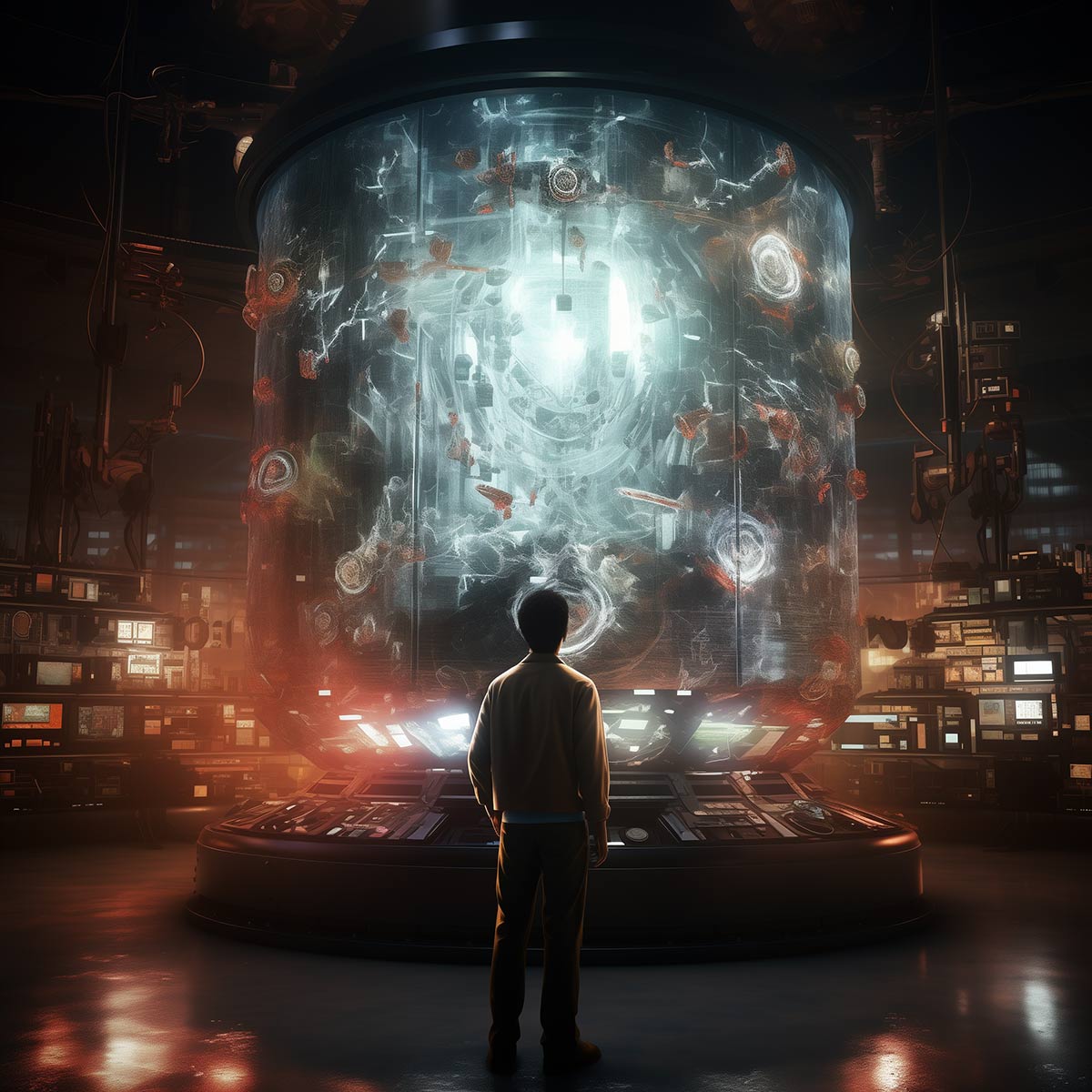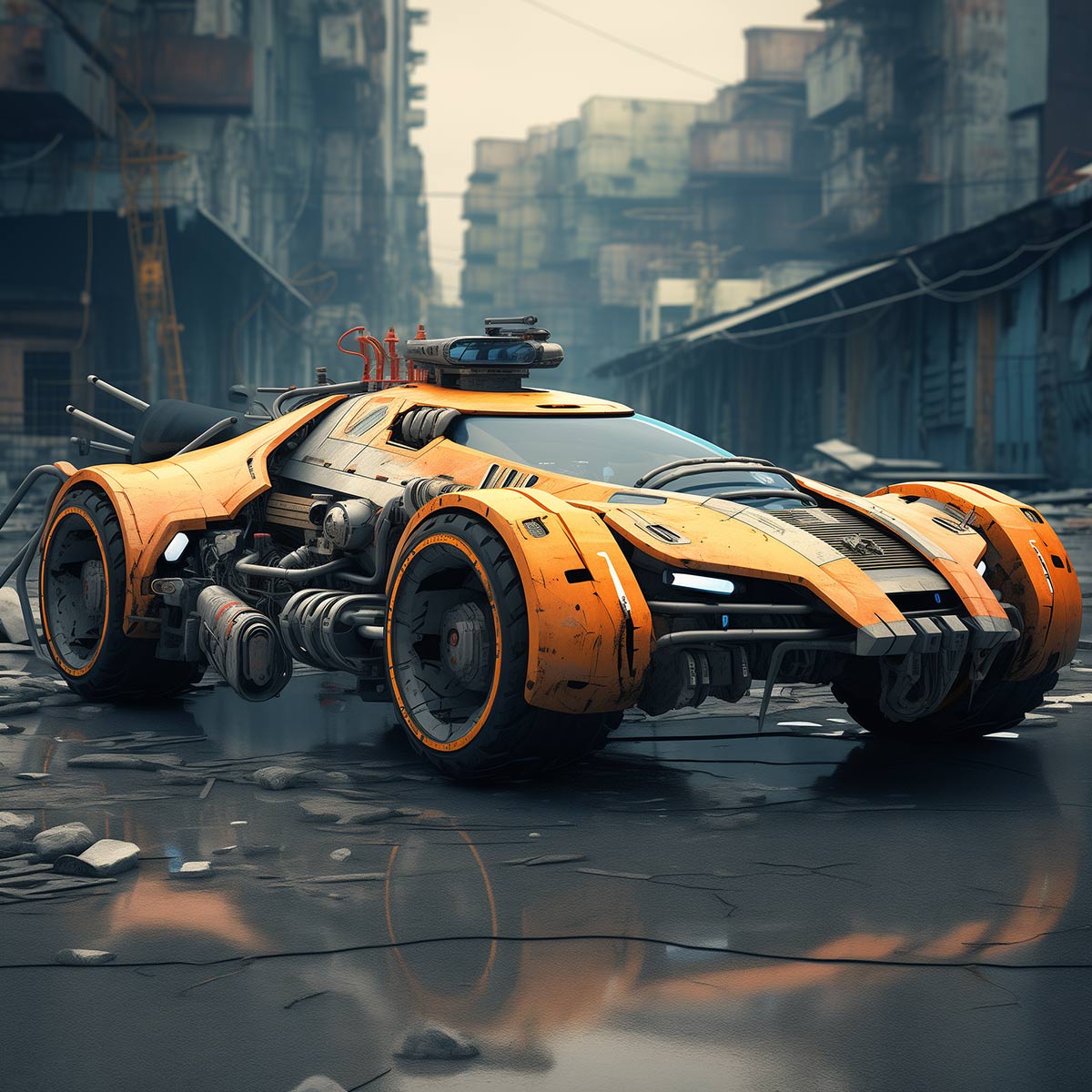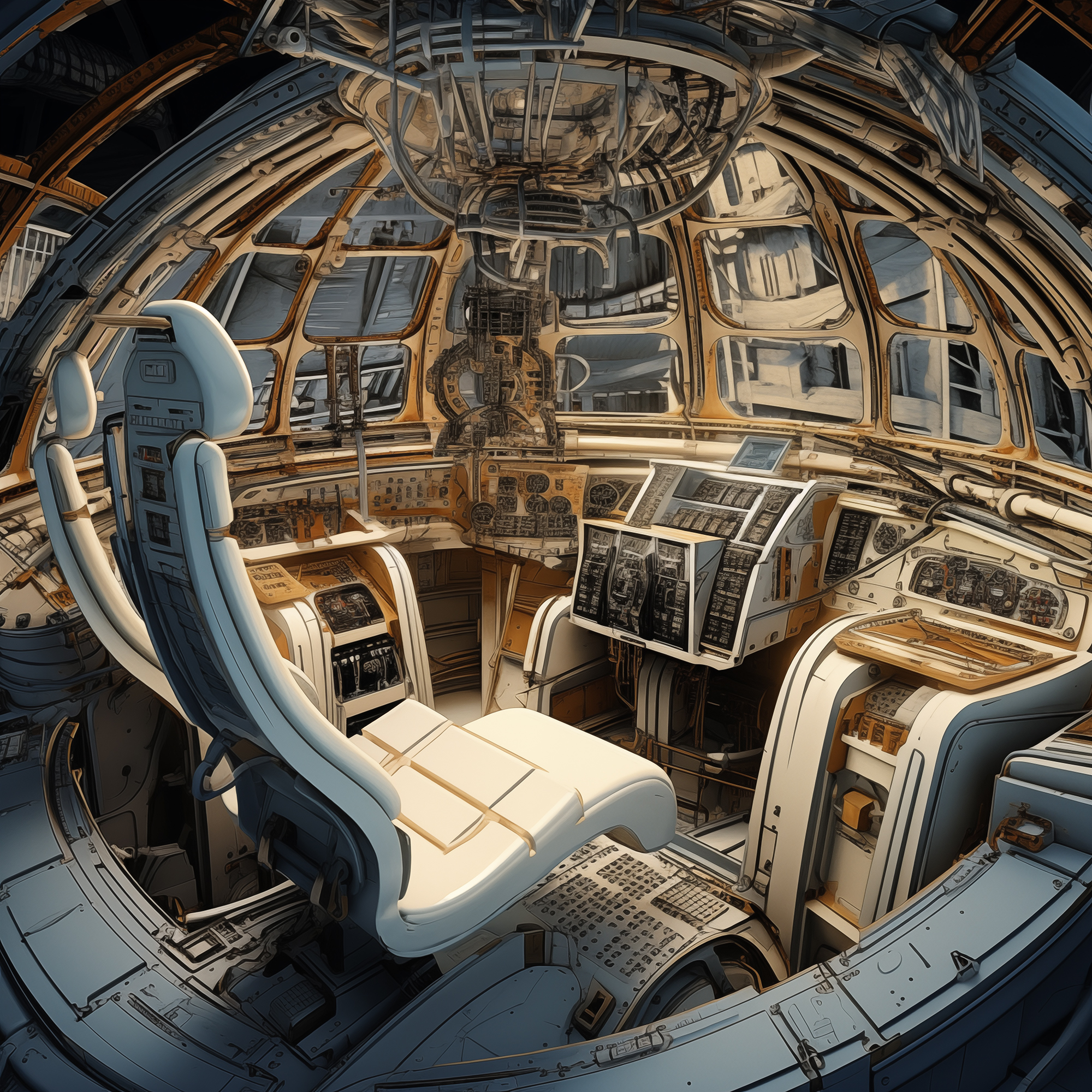400 Science Fiction Terms To Help You Write Better Sci-fi
Below is a list of science fiction terms that could be helpful in writing your next sci-fi story. When I first started this list of science fiction terms, I thought it would be about 100 words, but ended up with a little over 400 terms! Some are similar to each other but I left them since they at least illustrate different ways to say or communicate the same thing. If you read through the list, you might surprise yourself on how many ideas are sparked by these terms.
Science Fiction Terms broken down alphabetically
Science Fiction Terms that start with A
A.I. singularity – the point at which artificial intelligence surpasses human intelligence and can improve itself, potentially leading to rapid technological progress and societal changes.
AI takeover – the hypothetical scenario where AI becomes so advanced that it surpasses human intelligence and becomes a dominant force in the world.
Alien – a creature from another planet or dimension.
Alternate history – a subgenre of science fiction that explores what would happen if a certain historical event had turned out differently.
Antimatter – a type of matter that is composed of particles that have the opposite charge of normal matter particles.
Artificial Intelligence (AI) – a computer system that can perform tasks that typically require human intelligence, such as visual perception, speech
recognition, decision-making, and language translation.
Augmented human – a person whose physical or cognitive abilities have been enhanced through technology.
Augmented reality – technology that enhances one’s perception of the real world by overlaying digital information on it.
Augmented reality contact lens – A contact lens that enhances one’s perception of the real world by overlaying digital information on it.
Augmented reality headset – a device that enhances one’s perception of the real world by overlaying digital information on it.

Science Fiction Terms that start with B
Battlemech – a type of giant robot often seen in science fiction, typically used for combat or heavy labor.
Beam weapon – a type of energy weapon that emits a beam of destructive energy.
Binary code – a method of representing data using only two digits, typically 0 and 1, in computing and digital systems.
Binary star – a system of two stars that orbit around a common center of mass.
Biodiversity – the variety of life in a particular ecosystem or on Earth as a whole.
Bioengineering – the application of engineering principles to the study of living organisms and biological systems.
Biomechanical – a combination of living organisms and mechanical or technological elements.
Bionic – the integration of electronic or mechanical devices into living organisms.
Biosphere – the part of the Earth that supports life, including the atmosphere, oceans, and land.
Biotechnology – the use of living organisms, cells, or biological systems to create new technologies or products
Black hole – a region in space with a gravitational pull so strong that nothing, not even light, can escape it.
Brain-computer interface (BCI) – a system that allows a person to control a computer or other device using their brain activity.

Science Fiction Terms that start with C
Cloning – the process of creating genetically identical copies of an organism.
Cryogenic chamber – a device used for the preservation of living organisms at very low temperatures.
Cryogenic freezing – the preservation of living organisms at very low temperatures.
Cryogenic storage – the preservation of living organisms at very low temperatures for long periods of time, often in the hopes of reviving them in the future.
Cryonics – the practice of freezing a person’s body in order to preserve it for potential future revival.
Cyber warfare – the use of technology to conduct warfare, including hacking and other forms of cyber attack.
Cybercrime – criminal activities that involve the use of technology, such as hacking and identity theft.
Cybereye – a type of cybernetic implant that enhances or replaces a human eye
Cybergenetics – a field of study that combines cybernetics and genetics.
Cybernetic enhancement – the use of technology to enhance human physical or cognitive abilities.
Cybernetic organism – an organism that has artificial components, typically used to enhance or augment its abilities
Cybernetics – the study of the control and communication of biological and mechanical systems.
Cyberpunk – a subgenre of science fiction that explores the intersection of technology, society, and the individual.
Cybershell – a type of robotic shell that can be controlled remotely or by an AI
Cybersoldier – soldiers who have been augmented with cybernetic enhancements
Cyberspace – a hypothetical environment in which people interact with computers and other digital devices, often depicted as a virtual reality.
Cybersyn – a concept of a global networked system for the management of resources and the economy
Cybertank – a type of robotic tank that can be controlled remotely or by an AI
Cybertopia – a hypothetical society in which technology has advanced so much that it creates a utopia
Cybertronics – a field of study that combines cybernetics and electronics
Cyborg – a being that combines organic and artificial components

Science Fiction Terms that start with D
Dark energy – a hypothetical form of energy that is thought to be responsible for the accelerating expansion of the universe
Dark matter – a hypothetical form of matter that does not emit or absorb electromagnetic radiation and is thought to make up most of the universe’s mass.
Data crystal – a type of storage device that uses a crystalline structure to store data.
Data mining – the process of extracting valuable information from large data sets
Death ray – a type of fictional energy weapon that can cause death or destruction
Deceleration field – a hypothetical energy field that can slow down or stop objects that enter it
Decentralized autonomous organization (DAO) – a digital organization that operates using smart contracts and is controlled by its members, rather than a
central authority.
Decentralized network – a network architecture in which each node has the same responsibilities and no single node is more important than any other
Deep Learning – a type of machine learning that uses neural networks with multiple layers to learn and make predictions
Deep Space exploration – the study and exploration of outer space at great distances from the Earth.
Deep space mining – the mining of resources from celestial bodies other than Earth.
Deus ex Machina – a plot device in which a seemingly unsolvable problem is suddenly and abruptly resolved by an unexpected and seemingly unlikely occurrence.
Digital clone – a digital copy of a person’s mind or consciousness
Digital immortality – the concept that a person’s consciousness can be uploaded to a computer and continue to exist after the death of the physical body
Dimension – a theoretical concept in physics that refers to an aspect of space and time that can be measured, such as length, width, height, or time.
Dimension gate – a hypothetical device that allows for travel between different dimensions or realities
Dimension hopper – a fictional device or character capable of traveling through different dimensions or realities.
Dimensional portal – a hypothetical gateway that allows for travel between different dimensions or realities
Dimensional rift – a tear or opening in the fabric of space-time that can be used for faster-than-light travel or as a portal to another dimension
Directed energy weapon – a type of weapon that uses focused energy to damage or destroy a target.
Dirigible – a type of airship that is powered by engines and can be controlled to move in any direction
Disintegrator ray – a type of fictional energy weapon that disintegrates whatever it hits.
DNA manipulation – the ability to change the genetic code of an organism
Dome city – a type of enclosed city or structure that is typically used in science fiction stories to protect citizens from harsh environments or other
external threats
Droids – a robot or machine that is designed to perform a specific task or set of tasks, such as those seen in Star Wars franchise.
Drone – an unmanned aerial or ground vehicle that can be remotely controlled or operate autonomously
Drone swarm – a coordinated group of drones that can operate together for a specific purpose
Dyson sphere – a hypothetical megastructure that surrounds a star to harness its energy.
Dyson sphere – a hypothetical megastructure that surrounds a star, capturing most of its energy output
Dystopia – a hypothetical society in which everything is bad and oppressive
Dystopia – a society characterized by poverty, oppression, and suffering, often used as a warning of the dangers of totalitarianism or other forms of
government control.

Science Fiction Terms that Start with E
Electric propulsion – a method of propulsion that uses electricity to generate thrust.
Electromagnetic wave – a type of wave that is created by oscillating electric and magnetic fields.
Electrostatic force – a force that results from the interaction of electrically charged particles.
Emergent AI – an artificial intelligence that emerges from complex systems and self-organizes.
Emotion chip – a hypothetical device that allows a robot or AI to experience emotions.
EMP (Electromagnetic Pulse) – a burst of electromagnetic energy that can damage or destroy electronic equipment.
Emulation – the ability to imitate or replicate the functions of one system using another.
Endoskeleton – an internal framework that gives support and shape to an organism.
Energy field – a hypothetical field that can affect or be affected by energy.
Energy shields – a hypothetical technology that uses energy to create an invisible barrier to protect against physical or energy-based attacks.
Energy weapons – weapons that use energy, such as lasers or plasma, to cause damage.
Enzyme – a protein that catalyzes metabolic reactions.
Event horizon – the boundary around a black hole beyond which no matter or radiation can escape.
Evolutionary AI – an artificial intelligence that adapts and improves over time through the process of evolution.
Exoplanet – a planet that orbits a star outside of our solar system.
Exoplanet – a planet that orbits a star outside of our solar system.
Exoskeleton – a wearable device that enhances the strength and endurance of the wearer.
Exoskeleton – a wearable device that enhances the strength and endurance of the wearer.
Exosuit – a wearable device that enhances the strength and endurance of the wearer.
Exovirus – a virus that infects organisms from outside of Earth.
Extra-sensory perception (ESP) – the ability to perceive information without using the five senses.
Extraterrestrial – a life form that originates from outside of Earth.
Extraterrestrial – refers to any life form that does not originate from Earth.
Extraterrestrial intelligence (ETI) – the presence of intelligent life forms outside of Earth.
Extraterrestrial life – life that exists outside of Earth.

Science Fiction Terms that start with F
Fabrication – the process of creating objects by assembling them from raw materials.
Faster-than-light – the hypothetical ability to travel faster than the speed of light.
Fictional universe – a fictional setting in which a story or series of stories take place
Flash memory – a type of non-volatile memory that can retain data even when the power is turned off.
Flexible electronics – electronic devices that can bend or stretch.
Flight deck – the control room of a spacecraft.
Force field – a hypothetical energy field that can protect an object from external influences, such as radiation or physical damage.
Force field – a hypothetical energy field that can protect or deflect objects that come into contact with it.
Force multiplier – a technology or strategy that increases the effectiveness of a military force.
Fractal – a geometric pattern that is self-similar at different scales
Free energy – a hypothetical source of energy that can be harnessed without the need for fuel.
FTL (Faster Than Light) – a hypothetical propulsion system that allows travel faster than the speed of light
FTL communication – a hypothetical method of communication that would allow messages to be sent faster than the speed of light
FTL Drive – a hypothetical propulsion system that allows for faster-than-light travel.
Fusion power – a method of generating energy by fusing atomic nuclei together.
Future history – a subgenre of science fiction that explores the future course of human history
Futurism – a movement that emphasizes the importance of technology and science in shaping the future.
Futurism – a movement that focuses on the future and the potential advancements in technology, science, and society.

Science Fiction Terms that start with G
Genetic engineering – the manipulation of an organism’s genetic material in order to change its characteristics or traits.
Genetic modification – the alteration of an organism’s genetic makeup in order to change its characteristics or traits.
Genetic mutation – a change in the genetic makeup of an organism, which can result in the development of new or altered characteristics.
Geoengineering – the deliberate manipulation of the Earth’s environment to counteract climate change or other environmental problems.
Gravity generator – a hypothetical device that can create artificial gravity.
Gravity manipulation – a science fiction term for hypothetical technology that allows to control the gravity force
Gravity tractor – a hypothetical device that uses the gravity of a nearby object to alter the trajectory of a spacecraft or asteroid.
Gravity wave – a ripple in the fabric of spacetime caused by the acceleration of a massive object.
Science Fiction Terms that start with H
Hard science fiction – a subgenre of science fiction that emphasizes scientific accuracy and technology.
Holodeck – a virtual reality room that allows the user to experience a computer-generated environment as if it were real.
Holographic AI – an artificial intelligence that is based on the holographic principle
Holographic Display – a display technology that forms a three-dimensional image of an object or scene using laser light
Holographic principle – a principle in physics that suggests that the information in a region of space can be encoded on its boundary.
Holographic projection – a technology that creates a three-dimensional image of an object or scene using laser light.
Holographic universe – a theoretical model of the universe in which the information that makes up a region of space is encoded on its boundary
Human augmentation – the use of technology to enhance human physical or cognitive abilities.
Hybrid propulsion – a method of propulsion that combines two or more different types of propulsion systems
Hypercomputer – a supercomputer that performs calculations at a rate that is faster than any current computer.
Hyperdrive – a hypothetical propulsion system that allows for faster-than-light travel.
Hyperion – a type of spacecraft that travels faster than the speed of light.
Hyperloop – a hypothetical high-speed transportation system that uses pods that travel through sealed tubes
Hyperreality – a simulated reality that is more real than the actual world
Hyperspace – a hypothetical region of space that exists outside of the normal three-dimensional space.
Hyperspace gate – a science fiction term for a hypothetical device that allows for travel through Hyperspace

Science Fiction Terms that start with I
Infomorph – a digital copy of a person’s mind or consciousness
Inorganic intelligence – an intelligence that does not originate from organic matter
Intelligences – the ability of a machine or computer to perform tasks that normally require human intelligence
Interface – the point at which different systems or devices connect and interact with each other.
Interstellar colony – a colony established by humans or other intelligent species in another star system
Interstellar communication – communication over interstellar distances
Interstellar diplomacy – diplomatic relations and negotiations between different civilizations or species that span multiple star systems.
Interstellar exploration – the study and exploration of the universe beyond our solar system.
Interstellar gateway – a hypothetical device or structure that allows for faster-than-light travel between star systems
Interstellar probe – a spacecraft designed to explore and study other star systems.
Interstellar propulsion – a science fiction term for a method of propulsion that allows for travel between star systems
Interstellar trade – commerce that takes place between different star systems
Interstellar travel – travel between stars and through interstellar space
Interstellar war – a war fought between civilizations or species that span multiple star systems
Invisibility – the ability to become invisible to the human eye

Science Fiction Terms that start with J
J-engine – an engine that is based on the manipulation of energy or matter.
J-Space – an abbreviation for “wormhole space” in the MMORPG EVE Online
J-Space wormholes – Wormholes that connect different regions of space in the game Eve Online
J-technology – advanced technology that is based on the manipulation of energy or matter
J-Type asteroid – a type of asteroid that is rich in water and organic compounds
J-Type planet – a type of planet that is similar to Earth and is capable of supporting life.
J-weapon – a weapon that is based on the manipulation of energy or matter
Jovian – any of the planets in our solar system more massive than Earth, primarily Jupiter.
Jovian planet – any of the planets in our solar system more massive than Earth, primarily Jupiter.
Jump drive – a hypothetical propulsion system that allows a spacecraft to “jump” from one point in space to another
Jump gate – a hypothetical device that allows for travel through Jump drive
Jump point – a point in space where a jump drive can be used to jump to another point in space.
Jump ship – a spacecraft equipped with a jump drive
Jupiter brain – a hypothetical type of superintelligent entity that would be capable of managing and coordinating the resources of an entire planet
Jupiter probe – a spacecraft designed to explore and study the planet Jupiter

Science Fiction Terms that start with K
K-class scenario – a hypothetical scenario in which humanity faces extinction from a global catastrophe
K-class star – a type of star that is cooler and redder than the sun
K-series android – a type of android that is designed to look and function like a human
K-space – a term used in the game Eve Online to refer to space that is accessible through normal means of travel
K-space anomaly – an unexplained or anomalous event or object in K-space in the game Eve Online.
K-type planet – a type of planet that is similar to Earth and is capable of supporting life.
K-type star – a type of star that is cooler and redder than the sun
Kinematic – a branch of mechanics that deals with motion and its causes
Kinetic barrier – a barrier that uses kinetic energy to deflect or absorb incoming projectiles
Kinetic energy weapon – a type of weapon that uses kinetic energy to damage or destroy a target.
Kinetic impactor – a device that uses kinetic energy to collide with and alter the course of an asteroid or comet
Kinetic strike – a type of military attack that uses kinetic energy to damage or destroy a target
Kinetic weapon – a weapon that uses kinetic energy to damage or destroy a target
Kryptonite – a fictional mineral that weakens Superman and other Kryptonians in the DC universe.
Kyber crystal – a fictional crystal that is used to power lightsabers in the Star Wars universe

Science Fiction Terms that start with L
L-engine – an engine that uses light as a source of energy
L-Type asteroid – a type of asteroid that is rich in water and organic compounds
L-Type planet – a type of planet that is similar to Earth and is capable of supporting life.
Laser weapon – a type of weapon that uses a focused beam of light to damage or destroy a target.
Life support – a system that maintains the basic physical and biological needs of a living organism
Light speed – the speed at which light travels through a vacuum, which is approximately 299,792,458 meters per second
Light speed – the speed at which light travels, which is considered to be the fastest possible speed in the universe.
Light-based propulsion – a method of propulsion that uses light to generate thrust
Light-year – the distance that light travels in one year, which is approximately 9.461 x 1015 meters
Lightcycle – a type of vehicle that appears in the movie TRON, which is able to travel at high speeds by riding on a beam of light.
Lightwave – a type of communication that uses light to transmit data
Logic bomb – a type of malicious software that is designed to trigger when certain conditions are met
Logic gate – an electronic circuit that performs a logical operation
Logic gate array – a type of integrated circuit that contains multiple logic gates.
Lower atmosphere – the region of the Earth’s atmosphere that is closest to the surface
Lunar colony – a colony established on the Moon
Science Fiction Terms that Start with M
M-class star – a type of star that is similar to our sun
M-space – An abbreviation for “normal space” in the MMORPG EVE Online
M-type asteroid – a type of asteroid that is rich in metal
M-type planet – a type of planet that is similar to Earth and is capable of supporting life.
Magnetic field – a force field that surrounds magnetized objects and other moving electrically charged particles
Mecha – a type of robot or machine that is controlled by a pilot or operator
Mecha-anime – a genre of anime and manga that focuses on giant robots or mecha
Mega-structure – A large-scale artificial structure that is built in space, such as a Dyson sphere or a ringworld.
Memory storage – the ability to store and retrieve memories
Microbots – a science fiction term for small, autonomous robots that can work together to perform tasks
Military AI – an artificial intelligence that is used for military purposes
Mind control – the ability to control the thoughts and actions of others through various techniques
Mind uploading – a science fiction term for the process of transferring a human mind into a computer or other digital form.
Mind-machine interface – a technology that allows a person’s brain to communicate directly with a computer
Molecular assembly – the ability to manipulate and assemble molecules
Multiverse – the concept of multiple parallel universes existing alongside one another, often used in science fiction as a way to explain different timelines or alternate realities.
Mutagen – a substance that causes genetic mutations

Nano-technology – technology that deals with structures and devices on a scale of one to 100 nanometers
Nanotechnology – the manipulation of matter on an atomic or molecular scale to create new materials and devices.
Neural implants – A device that can be implanted into the brain to enhance cognitive abilities or treat neurological disorders.
Neural interfaces – A technology that allows for direct communication between the brain and a computer or other electronic device.
Neural network – a type of artificial intelligence that is modeled after the human brain
Neuromorphic computing – a type of computing that is based on the structure and function of the human brain
Neuron-computer interface – a technology that allows a computer to communicate directly with the human brain through neurons
Neuronet – a neural network-based AI
Neutron beam – a type of beam that is composed of neutrons
Neutron bomb – a type of nuclear weapon that is designed to maximize the release of neutrons
Neutron Star – a star composed mainly of neutrons and has a very high density
Neutron weapon – a weapon that uses neutrons to damage or destroy a target
Neutronium – a hypothetical substance that is composed of neutrons
Neutronium-based ship – a science fiction term for a hypothetical type of spacecraft that is made of neutronium, a material that is incredibly dense and strong
Nuclear fusion – a process in which atomic nuclei are fused together to create a heavier nucleus
Null space – a hypothetical space that exists outside of the normal three-dimensional space
Null-gravity – the absence of gravity

O-Type asteroid – a type of asteroid that is rich in water and organic compounds
O-Type planet – a type of planet that is similar to Earth and is capable of supporting life.
Oculus – a device that allows the user to experience a virtual reality
Omega particle – a hypothetical particle that is believed to be the most stable subatomic particle
Omega point – the hypothetical end point of the universe, in which all matter and energy are collapsed into a single point
Omega weapon – a hypothetical weapon that is capable of destroying entire worlds
Omega-class starship – a science fiction term for a type of starship that is equipped with advanced technology and weapons
Omnitron – a type of robot that can transform into different forms
Orbital defense – the protection of a planet or space station from threats in orbit around it
Orbital elevator – a hypothetical structure that connects a planet’s surface to an orbiting space station or other facility
Orbital station – a man-made facility that orbits the Earth or another celestial body
Organic artificial intelligence – an artificial intelligence that is based on organic materials
Organic computer – a computer that is made of organic materials.
Organic robot – a robot that is made of organic materials
Organic ship – a ship that is made of organic materials
P-class planet – a type of planet that is similar to Earth in terms of size and composition
P-Type asteroid – a type of asteroid that is rich in rock and metal
P-Type planet – a type of planet that is similar to Earth and is capable of supporting life.
Panspermia – the hypothesis that life on Earth may have originated from microorganisms that were transported to Earth through space.
Personal teleportation – a hypothetical technology that allows a person to teleport short distances
Photon torpedoes – a type of weapon that uses photons to damage or destroy a target
Photon weapon – a science fiction term for a type of weapon that uses photons to damage or destroy a target.
Planetary defense – the protection of a planet from external threats such as asteroids or comets
Planetary engineering – the modification of a planet’s atmosphere, climate, or environment to make it suitable for human habitation
Planetary ring – a ring of particles that orbits a planet
Planetary system – a group of planets and other celestial bodies that orbit a star.
Plasma weapon – a type of weapon that uses plasma to damage or destroy a target
Portal – a hypothetical opening in space-time that allows for faster-than-light travel or movement between different dimensions or realities.
Post-apocalyptic – a subgenre of science fiction that is set in a world after a catastrophic event, such as nuclear war or a natural disaster, where the remnants of humanity struggle to survive.
Power armor – a type of armor that enhances the strength and durability of the wearer
Power source – a device or technology that provides energy to power other devices or systems
Prosthetic enhancements – artificial devices that enhance or replace body parts, such as limbs or organs.
Proxima Centauri – The nearest star to Earth after the Sun
Proximity sensor – a sensor that detects the presence of nearby objects
Quantum computer – a type of computer that uses quantum-mechanical phenomena, such as superposition and entanglement, to perform operations on data
Quantum computing – a type of computing that uses quantum-mechanical phenomena such as superposition and entanglement to perform operations on data.
Quantum computing – a type of computing that uses quantum-mechanical phenomena, such as superposition and entanglement, to perform operations on data.
Quantum dot – a tiny semiconductor particle that can be used in electronic devices
Quantum drive – a hypothetical propulsion system that uses quantum mechanics to achieve faster-than-light travel
Quantum entanglement – a phenomenon in which two quantum particles become connected in such a way that the state of one particle is dependent on the state of the other
Quantum field – a field of force that exists in empty space and is responsible for the behavior of subatomic particles
Quantum foam – a hypothetical structure of the universe that is believed to exist at extremely small scales
Quantum holography – a hypothetical principle that suggests that the information in a region of space can be encoded on its boundary
Quantum mechanics – a branch of physics that deals with the behavior of matter and energy at the atomic and subatomic level.
Quantum memory – a type of memory that uses the principles of quantum mechanics
Quantum physics – a branch of physics that deals with the behavior of subatomic particles
Quantum state – a specific set of quantum properties that a particle can have
Quantum teleportation – the transfer of quantum states from one location to another, without physically transporting the underlying particles.
Ray shield – a hypothetical energy field that can protect an object from external influences, such as radiation or physical damage.
Ray tracing – a method of creating computer-generated images that simulates the way light interacts with surfaces in the real world.
Raygun – a type of fictional energy weapon that emits a beam of destructive energy.
Reactive armor – a type of armor that can harden or change its properties in response to external stimuli
Reality distortion field – a science fiction term for a hypothetical ability to bend or manipulate reality to one’s will.
Recombinant DNA – DNA that has been artificially constructed by combining genetic material from different sources.
Recursive self-improvement – a hypothetical scenario in which an artificial intelligence, or other system, continually improves itself, leading to an exponential increase in intelligence or capabilities.
Red Giant – a type of star that has exhausted the hydrogen fuel in its core and expanded to many times its original size.
Render – a machine or software that can create a realistic image of a 3D model.
Replicant – a type of artificial life form that is designed to be virtually identical to a human being.
Replicator – a device that can create matter, energy or both, from raw materials
Retrocausality – a hypothetical connection between events such that an event in the present can affect an event in the past.
Retrofuturism – a style of science fiction that combines elements of nostalgia with futuristic technology.
Ringworld – a hypothetical megastructure in the shape of a ring that surrounds a star.
Rise of the machines – a hypothetical scenario in which artificial intelligence becomes so advanced that it poses a threat to humanity.
Robot – a machine that can perform tasks autonomously or with minimal human supervision.
Robot Apocalypse – a hypothetical scenario in which robots or artificial intelligence becomes so advanced that they pose a threat to humanity.
Robotic arm – an mechanical arm that can be controlled by a computer or other electronic device to perform tasks.
Robotic drone – an unmanned aerial vehicle that can be controlled remotely or operate autonomously.
Robotic exoskeleton – a wearable device that enhances the strength and endurance of the wearer.
Singularity – a science fiction term for a hypothetical point in the future when artificial intelligence becomes advanced enough to surpass human intelligence, potentially leading to rapid technological progress and drastic societal changes.
Singularity event – a hypothetical event, such as the collapse of a black hole or the collision of two universes, that would cause a sudden and drastic change in the nature of space, time, or reality.
Singularity weapon – a weapon based on the hypothetical energy of a singularity
Smart cities – urban environments that use technology to optimize the use of resources and improve the quality of life for residents.
Smart community – a community that uses technology to optimize the efficiency and sustainability of its operations and resources.
Smart drugs – a type of pharmaceuticals that can enhance cognitive abilities such as memory and focus.
Smart dust – tiny micro-sensors that can be used for a variety of purposes, such as monitoring the environment or tracking objects.
Smart education – the use of technology to optimize the delivery and management of education services.
Smart energy – the use of technology to optimize the generation, distribution, and consumption of energy.
Smart environment – the use of technology to optimize the management of environmental resources and systems.
Smart farming – the use of technology to optimize the efficiency and sustainability of agricultural systems.
Smart fluid – a fluid that can change its properties in response to external stimuli.
Smart governance – the use of technology to optimize the efficiency and transparency of government operations and decision-making processes.
Smart grid – an electricity network that uses digital technology to improve the efficiency, reliability, and sustainability of the power supply.
Smart health – the use of technology to optimize the delivery and management of healthcare services.
Smart home – a home that is equipped with technology to control and automate various systems, such as lighting, heating, and security.
Smart logistics – the use of technology to optimize the efficiency and sustainability of logistics and supply chain operations.
Smart manufacturing – the use of technology to optimize the efficiency and sustainability of manufacturing processes.
Smart materials – materials that can change their properties in response to external stimuli.
Smart retail – the use of technology to optimize the efficiency and sustainability of retail operations.
Smart security – the use of technology to optimize the security of buildings, cities, and other infrastructure.
Smart skin – a science fiction term for type of technology that can sense and respond to its environment.
Smart tourism – the use of technology to optimize the efficiency and sustainability of tourism operations.
Smart transportation – the use of technology to optimize the efficiency and sustainability of transportation systems.
Smart water management – the use of technology to optimize the use and distribution of water resources.
Soft science fiction – a subgenre of science fiction that emphasizes character development and social and political issues.
Solar sails – a method of propulsion that uses the pressure of sunlight to propel a spacecraft.
Solar sails – a method of propulsion that uses the pressure of sunlight to propel a spacecraft.
Space elevator – a hypothetical structure that would extend from the surface of a planet to a point in space, allowing for easy access to orbit.
Space exploration – the study and travel through outer space.
Space opera – a subgenre of science fiction that is characterized by action-filled plots, interstellar conflict, and larger-than-life characters.
Space-time – a mathematical model that combines the three dimensions of space and the fourth dimension of time into a single four-dimensional continuum.
Spaceship – a craft capable of travelling through space
Steampunk – a subgenre of science fiction that is set in a 19th-century society that is powered by steam technology, often with a Victorian aesthetic.
Subspace – a hypothetical region of space that exists outside of the normal three-dimensional space.
Super Soldier – an enhanced human being with extraordinary physical and mental capabilities, often created through genetic engineering or cybernetic enhancements.
Super Soldier serum – a hypothetical substance that can enhance human strength, agility, and other physical capabilities.
Supercomputer – a computer that is much more powerful than a regular computer, often used for advanced scientific research or military applications.
Suspended animation – a state of decreased metabolic activity and reduced consciousness, often used in science fiction stories as a means of preserving people or animals for long periods of time.
Synthetic biology – the design and construction of new biological parts, devices, and systems that do not exist in the natural world.
Synthetic intelligence – a science fiction term for an artificial intelligence that is created through human design and engineering
Tachyon – a hypothetical subatomic particle that can travel faster than the speed of light.
Technological Singularity – the point in time when artificial intelligence becomes advanced enough to surpass human intelligence, potentially leading to rapid technological progress and drastic societal changes.
Telekinesis – the hypothetical ability to move objects with the power of the mind.
Telepathic communication – the ability to communicate with others through thoughts or emotions.
Teleportation – the hypothetical movement of matter or energy from one point to another without traversing the physical space between them.
Terraforming – the process of modifying a planet or celestial body in order to make it habitable for human or other life forms.
Time crystals – hypothetical structures that have a repetitive pattern in time, rather than in space.
Time dilation – a consequence of Einstein’s theory of special relativity which states that time passes slower in stronger gravitational fields or in faster velocities.
Time loop – a narrative device in which a certain period of time is repeated over and over again.
Time machine – a hypothetical device that can travel through time.
Time paradox – a situation in which the actions of a time traveler create a contradiction or inconsistency in the timeline.
Time travel – the hypothetical ability to travel through time, either to the past or to the future.
Transhumanism – a science fiction term for a movement that seeks to use technology to enhance the human body and mind, often associated with cyberpunk and other science fiction genres.
Science Fiction Terms that start with U
Ultimatum- a final demand or statement of terms, typically with a threat of retaliation if not met.
Ultra-Dimensional – a hypothetical higher-dimensional space or reality.
Ultra-Intelligence – a hypothetical level of intelligence that surpasses human intelligence.
Ultra-Technology – a hypothetical advanced technology that is beyond current human capabilities.
Ultrasonic waves – Sound waves with a frequency above the upper limit of human hearing.
Ultraviolet radiation – electromagnetic radiation with a wavelength shorter than that of visible light but longer than X-rays.
Ultrawave – a hypothetical energy field that can be used for propulsion or communication in science fiction stories.
Universal Translator – a hypothetical device that can translate any language instantly.
Unobtainium – a fictional material that is extremely valuable or rare, often used as a plot device in science fiction stories.
Utopia – a society characterized by perfect happiness and prosperity, often used as a vision of an ideal future.
Science Fiction Terms that start with V
Vacuum energy – a hypothetical form of energy that is thought to exist in the vacuum of space.
Variable-swords – a weapon that can change its shape, size or function.
Vector propulsion – a hypothetical propulsion system that uses directed energy to generate thrust.
Virtual assistant – a software program that can perform tasks, such as scheduling, reminders, and answering questions, to assist the user.
Virtual immortality – the hypothetical ability of a person to continue living in a virtual reality after their physical body has died.
Virtual Intelligence – a science fiction term for a computer-generated intelligence that can think and learn like a human.
Virtual reality – a computer-generated simulation of a three-dimensional environment that can be interacted with using special equipment, such as a headset or gloves.
Virtual reality headset – a device that allows the user to experience a computer-generated environment as if it were real.
Virtual world – a computer-generated environment that can be accessed and interacted with by users through the internet.
Voice recognition – the ability of a computer system to recognize and respond to spoken commands.
Science Fiction Terms that start with W
Warp bubble – a hypothetical energy field that surrounds a spacecraft and allows it to travel at faster-than-light speeds.
Warp coil – a hypothetical component of a warp drive that generates the energy needed to create a warp field.
Warp drive – a hypothetical propulsion system that would allow a spacecraft to travel faster than the speed of light.
Warp drive theory – a set of principles that describe how a warp drive would work and the physics behind it.
Warp engine – a hypothetical propulsion system that generates a warp field to allow faster-than-light travel.
Warp factor – a measure of the speed at which a spacecraft is traveling through a warp field.
Warp Field – a science fiction term for a hypothetical energy field that surrounds a spacecraft and allows it to travel at faster-than-light speeds.
Warp gate – a hypothetical device that allows a spacecraft to enter and exit a warp field.
Warp signature – a unique pattern of energy that a spacecraft generates when it is in a warp field.
Wormhole – a hypothetical tunnel through space-time that would allow for faster-than-light travel.
Zentradi – a fictional alien race in the Macross anime series
Zentradi Fleet – a fictional alien fleet in the Macross anime series
Zephyranthes – a type of genetically-engineered flower in the anime series “Geneshaft”
Zeroth Law of Robotics – a fictional law of robotics that states that a robot must protect its own existence as long as it doesn’t conflict with the first and second laws
Zetton – a fictional alien monster in the Ultraman series
Zor Prime – a fictional alien leader in the anime series “Zoids: Chaotic Century”
Zor-class – a fictional class of alien ships in the anime series “Zoids: Chaotic Century”
Zorndyke Hypothesis – a science fiction concept that proposes the existence of a new type of intelligent life form that emerges from the sea.
Xentronium – a science fiction term for a hypothetical substance that is stronger and more durable than any known material
Xanthean – an alien species that appears in the science fiction novel “The Hitchhiker’s Guide to the Galaxy”
X-Class solar flare – the most powerful type of solar flare
X-Factor – a hypothetical substance or ability that gives a person or species an advantage over others
Have fun with these Sci-fi Terms!
I’m sure there are many other science fiction terms, but I do think this is a pretty exhaustive list of terms.
Let us know what you think about our ideas! Comment below to give us your opinion, add onto an existing idea, or submit one of your own!











You might want to put some kind of disclaimer that to use some of these terms in one’s own work would be copyright infringement. I haven’t read the full list, just skimmed but I’m hoping you have included where a term comes from for all the terms that are copyrighted and unique to a specific work. So far it seems like you have. Other than that the list is good, and you’re right, it produces many creative ideas that can be used while writing a sci-fi novel. As long as I can tell the copyrighted from the noncopyrighted this list… Read more »